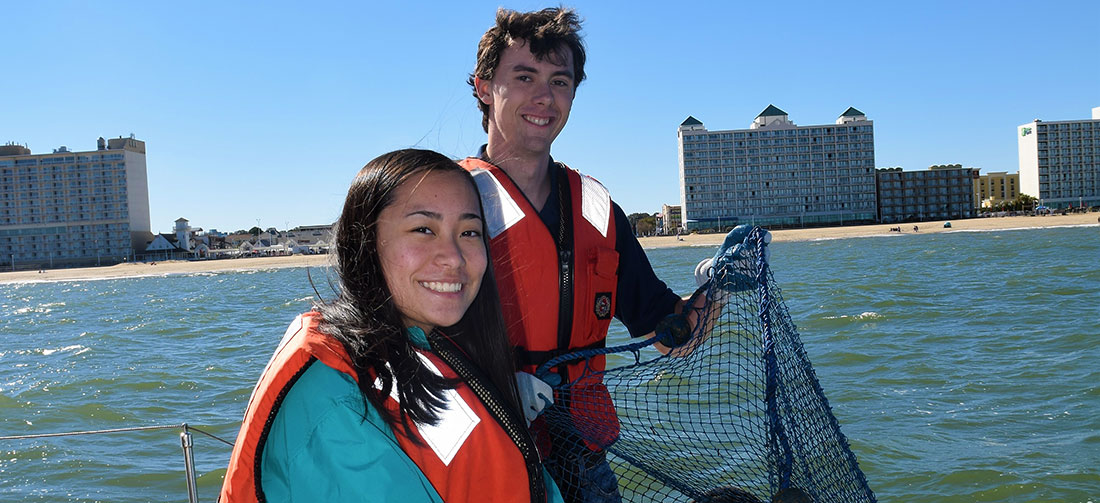
DIVE IN to Marine Science on the Mid-Atlantic
The VWU Marine Science Summer Program is a live and learn, immersion program for college students from around the country. Specifically designed for upper-division undergraduates majoring in biology, marine biology, earth and environmental science/studies, or general science, the six-week program is scheduled for May 22-June 30, 2023 on the campus of Virginia Wesleyan University. Students may earn credits by enrolling in the courses offered:
- BIO 319 Field Studies in Coastal Marine Environments (4 credits)
Be prepared to get wet! Through lectures, primary literature discussions, and field trips, students will pair ecological principles with field observation and data collection to understand the coastal environment. Major course topics include: organisms of the marine environment; sampling and analytical approaches for studying plankton, invertebrates, nekton, and plants; and conservation issues in marine ecosystems. Students will be introduced to commonly employed sampling designs and methods to explore the diversity of coastal intertidal environments. The course will culminate in a group research project.
Class will meet Tuesdays and Wednesdays 9:00 a.m. – 5:00 p.m.. Overnight field trips to local areas are possible. - EES 200 Oceanography (4 credits)
Oceanography is a 6-week immersive program in marine science that includes daily morning class lectures followed by afternoon laboratory and field excursions. The course explores the geology of the ocean basins and the physical and chemical nature of seawater. Topics studied include ocean waves, tides, currents and biodiversity of pelagic and benthic organisms. Links between the oceans and the atmosphere are explored with emphasis on the effect of oceans on climate, El Niño, and climate change. Involves extensive fieldwork, water quality analysis and specimen collection in the Chesapeake Bay and Atlantic Ocean habitats.
Class will meet Thursday and Friday 10:00 a.m. – 4:30 p.m. - BIO 489 Undergraduate Research (2 credits)
Offers students the opportunity to conduct original scientific research in an area of marine biology. Students work closely with a faculty mentor to develop and conduct a research field project, then present their findings orally at the end of the program.
*Courses meet for at least 7.5 hours per day and include intensive field work.
Virginia Wesleyan University is uniquely situated at the mouth of the Chesapeake Bay and offers a small residential atmosphere with access to both the Chesapeake Bay and Atlantic Ocean. Classes and labs will meet twice a week in the Greer Environmental Sciences Center, a state-of-the-art facility with active learning classroom space as well as dedicated research labs for housing marine organisms, mercury analysis (clean room), nutrient analysis, and environmental imaging in a microscopy suite that will house confocal and scanning electron microscopes. Wednesdays will be reserved for non-lab class (Dive Certification), longer field trips, and independent research supervised by professors.
Field trips will involve excursions on the Ocean Explorer, a 45-foot vessel that has the latest scientific instrumentation for sampling the marine environments, and day trips to a variety of coastal environments. Students will be able to sample ecosystems such as the marsh system of the Eastern Shore, dunes of the NC Outer Banks, Gulf Stream waters of the Atlantic, and the estuarine waters of the Chesapeake Bay. In collaboration with the Virginia Aquarium of Marine Science, students will be able to work with the stranding team on large and small whales, dolphins, seals and sea turtles. Overnight field trips to local areas are possible.
Mission
The Marine Science Summer Program at Virginia Wesleyan University (VWU) will engage students in scientific discovery through exposure to marine ecosystems and their organismal inhabitants, providing them with a better understanding of current marine issues on a local and global scale.
Program Costs
| BIO 319 Field Experience is Coastal Environments (4 credits) | $1796 |
| EES 200 Oceanography (4 credits) | $1646 |
| BIO 489 Undergraduate Research (2 credits) | $798 |
| Housing on campus is available (Room only) | $672/6 weeks |
| Total cost for 10 credits: | $4240 plus housing |
For information about the 2023 Marine Science Summer Program contact:
Dr. Soraya Bartol
Professor of Marine Biology
Supervisor of the Greer Center Aquatics Lab and Ocean Explorer
sbartol@vwu.edu


